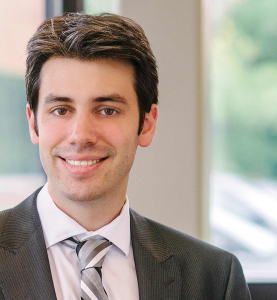Andrew Meltzer is a Special Education Attorney with Sussan, Greenwald & Wesler.

Sam Fogelgaren
Let's start with your personal background - what was your motivation to become a lawyer, and what brought you to special education and disability law?
Andrew Meltzer
My journey into special education law is a bit different. I like to joke that even though I’m in my late 20’s, I’ve had over 20 years of special education experience. I had an IEP - I had a lot of learning disabilities. For a number of years, it was a struggle. I walked in the shoes of people I represent. I know what its like to be in bad placement. I understand the stigma they go through.
In my situation, my parents realized that my placement was not appropriate, and they got experts to evaluate me. My district thought I had ADHD, but the evaluations showed I had something different and more specific. Once the district got that information, they switched my placements and supports, which helped me a lot. From there, I made a lot of progress. Even with an IEP, I took honors and advanced placement courses. I think the turning point was my parents instilled in me a sense of self-advocacy. In a sense, I became my own lawyer. I’d organize meetings between staff members if I was being treated unfairly.
Beyond that, I’ve always been interested in politics and the law. Becoming a lawyer was the best way to change the system. I became very familiar with special education law, and developed an understanding of how the mechanisms of the state bureaucracy work. Given my background, I was able to get a position with Sussan, Greenwald & Wesler, the oldest special education law firm in New Jersey.
It makes it a lot easier to advocate for clients when you have the same experiences, to have gone through that process with shared experiences. To be able to give them a sense of hope is very rewarding.
Sam
What are some of the biggest legal issues in the special education and disability communities?
Andrew
We represent a lot of individuals in the post 21 space - people who are aging out or who have already aged out. A main issue people and their families face is something known as the special services cliff. The legal standards for special education are very high. The Supreme Court’s Endrew F. decision says that IEP’s need to be ‘appropriately ambitious in light of a child’s circumstances.’ In New Jersey, the standard for an IEP is significant and meaningful education benefit to a child. With adult services, it’s very different, and its a big shock for families. When one goes into DDD, the legal standards are much lower. The focus is on functional needs - food, shelter, things like that. It’s not about challenging individuals to reach new heights.
I think something that needs to change is adult services must more closely mirror the school experience. Kids make incredible gains in school, and the post 21 system doesn’t have the dedicated staff and resources to keep that progress going.
At the same time, DDD is going through a massive structural change. DDD gets services funded by Medicaid. DDD used to operate on contract systems, where they contracted out to different service providers. Now they are switched to fee-for-service, in which they only get paid for specific services. While it sounds like a good idea in theory, agencies are getting confused over what services they can and can’t provide. Often, they claim that they don’t have the budgetary resources to meet individual needs. It’s been a rocky shift.
Sam
Is the problem the fee-for-service model, or are there strategic decision that can make the transition better?
Andrew
Fee for service will ultimately be a good thing. DDD administration and agencies have been as clear as they can be. The state needs to increase DDD case managers and staff - particularly the administrative staff. There are so many individuals who need DDD services. Everyone is overworked. Even though there’s a shift in how funding sources operate, everyone should be able to provide those services.
Sam
What is the state of disability policy in New Jersey? What impact do you see the Murphy administration having on the wide array of programs and institutions that impact people with disabilities?
Andrew
With the Murphy administration in power, this gives the state a really good opportunity to make meaningful changes. With Governor Christie, a lot of services were cut - specifically education and social services. And a ton of problems developed from those cuts. With Governor Murphy, we need to go along with his progressive leanings and work towards greater accountability with agencies. Much stronger oversight is critical - especially with group homes. When incidents occur, whether their nature be behavioral, or injury and sickness among residents, they need to be communicated promptly. Many families end up getting in contentious relationships with group homes, because they’re not reporting incidents to families in a timely manner. When you place a family member a family member in a group home, there needs to be trust that they are safe, and that doesn’t always happen. We need more stringent standards for reporting, a better and quicker method for conflict resolution, and more funding for DDD services.
(Part 2 can be found here)

